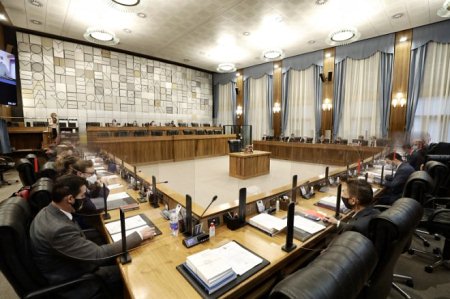With a large majority, the Valle d’Aosta Regional Council has given the green light to the bill on the use of hydrogen traction for rail transport. The approved text contains changes with respect to the version filed by the director Claudio Restano (VdA Unie) examined in the Commission as a result of two amendments by the VdA Unie, PCP, UV, AV-SA groups.
According to the approved wording, the law recognizes hydrogen as a storage system, energy carrier and alternative fuel to fossil sources.
The text provides that the Regional Council delivers within 180 days (no longer 60 as indicated in the original version of the proposal) to the Valle Council “a study of interventions for hydrogen mobility aimed at economic, environmental and integration checks between the various energy carriers , without prejudice to the already planned electrification interventions of the Aosta / Ivrea section “that RFI is planning. In the original version, the proposal spoke of a study of interventions “through a comparison between the electricity system and the hydrogen one”.
As regards the Aosta / Pré-Saint-Didier “the study must contain the cost and benefit assessment of the use of the hydrogen energy vector as an additional option with respect to those being evaluated”. The text originally asked instead to evaluate “the relationship between costs and benefits of its reopening, as well as making a comparison between the reopening of the section and public transport on hydrogen rubber”.
The law passed with 27 “yes”, 7 “no” and 1 abstention. The vote in the classroom was secret, as requested by the Lega VdA, but in the debate that preceded the vote, the councilors who spoke made their position understood.
From the PCP, the group from which the main criticisms of the proposal on hydrogen trains had come, the councilor Paolo Cretier emphasized the amendments. «Sometimes politics needs to be shared and not closed – he said -: this is what some of us have tried to do through a confrontation and politically mediating the amendments then shared by almost all our colleagues. We have not traded anything, we continue to have our progressive idea. The two themes, electrification and hydrogen, are complementary and not concurrent. Now it is up to us to make political reflections. “
For Aurelio Marguerettaz, UV group leader, “an ideological battle is taking place on this issue, but the railway is neither right nor left. To date, we do not know the overall final cost of electrification, nor do we have certain data on the actual benefits. This does not mean – he added – that with this bill we want to block the project from which, however, we will get few benefits. In fact, the real problem of our railway section is not traction, but the fact of having a single track ».
The former councilor for transport, Chiara Minelli, has maintained her opposition to the proposal. “The original purpose of this proposal – he accused – was to overturn the law 22/2016, which, on the other hand, is a law that marked an important political turning point in this region. It is a lack of respect towards the citizens and their organizations that have indicated a path ”. Minelli also spoke of a «provocative proposal: it was presented a few days after the announcement of the inclusion of the electrification project in the PNRR. The work that I carried out as councilor for the electrification of Ivrea / Aosta took place between the hostility of some councilors, the skepticism of others and the silence of the autonomist forces. I contacted both parliamentarians but I only had the support of the deputy. Evidently – added the CPP councilor – someone was bothered by having achieved the result that denies the opposing policies carried out for decades. In this bill there was a will of provocation by a councilor with the support of others: an entirely political operation by someone who wants to question the composition of the majority and a fundamental point of his program, who knows he can count on the vote of the minority, which does not look to merit but rubs its hands in seeing the split in the majority “
On the part of the League, Nicoletta Spelgatti pointed out the “gigantic political problem” within the majority. “I have heard of unity of purpose found in the majority, but everyone has understood the trick of the two amendments to postpone the problem until a later date. For the most part, visions at the antipodes emerge on all the fundamental issues ».
Also for the League, the deputy group leader Stefano Aggravi pointed out that «we currently do not have the electrification project and this generates a problem: the limits for the completion of the works are set by the PNRR for 2026. Will we succeed? Because it is one thing to have an allocation of funds, another is to have the technical project ».
The President of the Region, Erik Lavevaz, also spoke in the debate. In the railway sector, «hydrogen is not an alternative form of propulsion to electrification – he said -, it is the accumulator that allows energy to be transported. The counterpart that we can possibly put on the table is that of the environmental impact of the electrification infrastructures ». According to Lavevaz, «the development strategies of large-scale hydrogen production are at the top of all world powers and this bill fits perfectly into this trend, obviously requiring in-depth analysis of our reality with respect to overabundant production from renewable sources. Large spaces for development and experimentation, therefore, in which science and technology must be allowed to speak; only after having had a clear picture, with reliable data, will it be possible to make choices at a political level ”. For the president of the Region “there must be no ideological positions or counterpositions.”
EG
.

